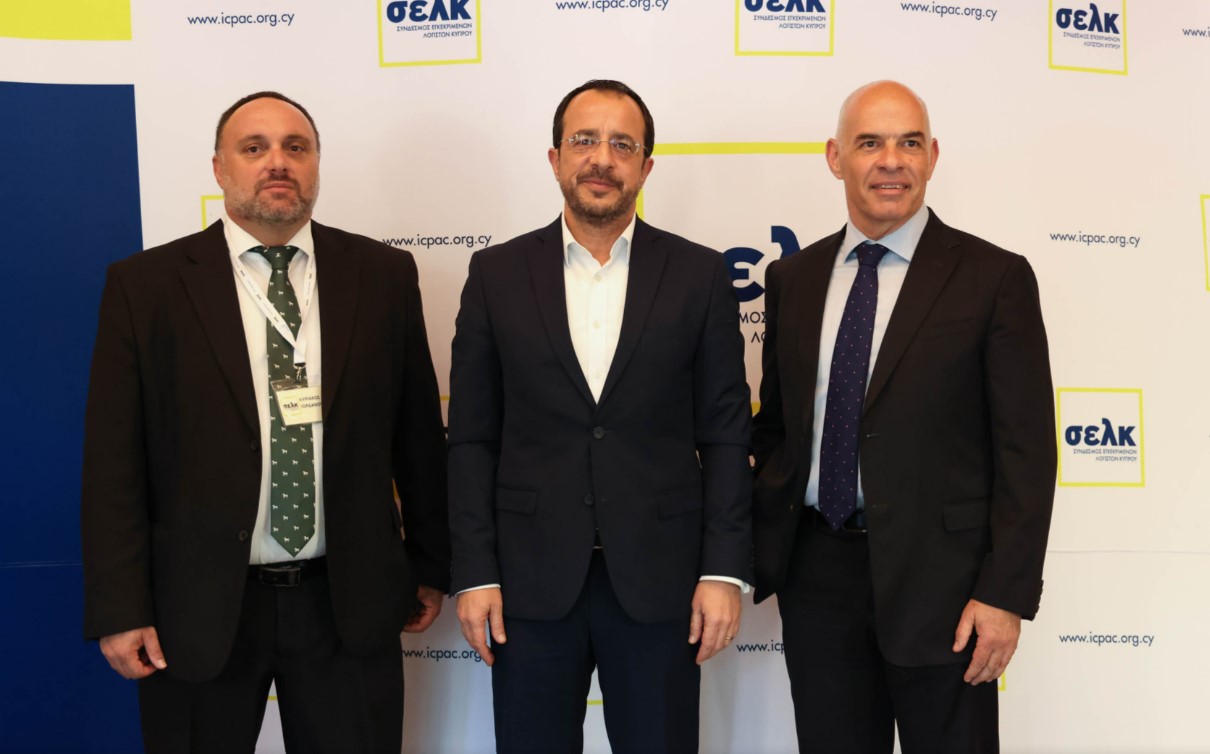Ensuring macroeconomic stability and the rational management of resources and public financial obligations is a fundamental objective of the government, said President Nikos Christodoulides on Wednesday evening.
Speaking at the 63rd annual general assembly of the Institute of Certified Public Accountants of Cyprus (ICPAC) at the Nicosia Municipal Theatre, the president emphasised that these measures aim to enhance the competitiveness of businesses and improve the living standards of every citizen in the Republic of Cyprus.
Christodoulides stated that economic indicators “demonstrate beyond any doubt that our economy is on the right track, and we will continue this responsible policy without populism or wishful thinking, while never resting on our laurels”.
“We take into account the fluid geopolitical environment and the need for a strong economy that allows us to develop a targeted social policy, a priority for our government,” he added.
Within this framework, the president highlighted that “fiscal responsibility, financial stability, and continuous structural reforms are the triptych that defines our economic policy and the decisions made by the Council of Ministers”.
He added that “this has secured significant successive upgrades from international rating agencies, which you surely understand the importance of, and the results of today’s issuance on international markets”.
Referring to the state of the Cypriot economy, the president noted that “despite the multiple and varied challenges facing the global economy, we have managed – through responsible and rational policies and approaches – to make Cyprus’ economy one of the top performers in the European Union in terms of economic performance”.

This, he continued, “is confirmed by the upgrades of the Cypriot economy by two major international rating agencies in the last two weeks”.
“Our country recorded the highest acceleration in the Eurozone and the entire European Union, with a growth rate of 3.5 per cent in the first quarter of 2024, compared to the EU average growth rate of just 0.4 per cent,” he added.
Regarding the years 2024 and 2025, President Christodoulides said that growth is expected to strengthen compared to 2023, unemployment is projected to continue its downward trend, and inflation will keep decelerating.
At the same time, he mentioned that “significant public debt reduction is being achieved, aiming to reduce it to below 60 per cent of GDP by 2026”.
Concerning the recent issuance of a seven-year bond worth €1 billion on international markets with an interest rate of 3.25 per cent and a yield of 3.31 per cent, President Christodoulides said “the strong interest from international and domestic investors quickly translated into a book of offers amounting to €9.6 billion, allowing the process to be completed swiftly with positive results for the Republic”.
“This issuance and its results demonstrate international investors’ confidence in the resilience and dynamism of the Cypriot economy, complementing the corresponding view of international rating agencies that have upgraded the Republic of Cyprus in the past two weeks,” he added.
The president also stressed that “with this successful issuance, executed in a challenging international environment marked by significant volatility and political turmoil affecting capital markets, the Republic of Cyprus proves its ability to continue financing its needs without issues and at a reasonable cost, ensuring the country’s long-term economic prospects”.
Regarding the agreement with the USA to institutionalise a strategic dialogue between the two countries, the President noted that it “enhances our country’s international standing, the status of the Republic of Cyprus, and provides a stable foundation for advancing our interests in security, defence, energy, research, and especially the economy, where there are vast opportunities”.
Specifically, he said that “the agreement provides for dialogue on cooperation in trade, investment, and development, areas whose importance we all understand to create a more resilient, competitive economy”.
Additionally, Christodoulides said that Cyprus’ high-quality professional infrastructure in the fields of administrative and advisory services is internationally recognised.
“Our vision includes, among other things, the modernisation of our tax system, a long-standing position of ICPAC, as the last transformation occurred in 2002,” he explained.
“The main pillars are to increase our country’s competitiveness, reduce the administrative burden for taxpayers and businesses, and provide fairer redistribution of the tax burden, with an emphasis on the middle class, which has traditionally been the backbone of Cyprus’ economy and society,” he added.
At the same time, he continued by saying “we aim to align our tax policies with the goals of the European Green Deal as part of the green tax reform, addressing the enormous challenges of climate change, whose consequences we experience daily”.

He stated that the green tax reform would undoubtedly contribute to achieving the country’s climate goals and “will help address some distortions in the economy, changing habits in polluting sectors such as transport, energy, and water, while promoting the circular economy”.
Moreover, he noted that it would boost innovation and green investments in energy, environmental protection, and waste reduction.
“Our roadmap to the green transition is very specific, and we must all contribute to its implementation because, as I repeat, the impacts of climate change are not distant; they are here,” he said.
“We must acknowledge this and, unfortunately, we have been delayed,” he added.
Referring to current issues, the President mentioned air conditioning in schools, fires, and migration, adding that “all these are directly related to climate change.”
“Think about the impact on our tourism with the temperatures in Cyprus, how it will affect tourism. Consider the pressure on the healthcare system due to all the factors I mentioned,” he said, adding that “the impacts are here”.
“We must move clearly faster; we were slow to realise the challenges of climate change,” the president stressed.
“Since some speak of the high cost of the green transition”, he continued, “what I urge us to consider is that any short-term cost we bear will be significantly lower than the cost we would have to undertake as a state, as businesses, as households, as a society if we do not act collectively and immediately”.
He also mentioned that another major goal set from the beginning of his administration is “the safeguarding of Cyprus’s reputation as a reliable business and financial centre”.
“From the outset, we have been working in cooperation with supervisory bodies, as well as with the technical support of international credible authorities, to protect our country’s reputation,” he added.
“We all need to approach this matter with absolute seriousness and with specific actions, such as the establishment of the Single Supervisory Mechanism for administrative service providers, to overturn a prevailing perception about our country,” he noted.
At this point, Christodoulides thanked the Institute of Certified Public Accountants of Cyprus (ICPAC) for its contribution to this effort, particularly in the effort to establish a Single Supervisory Mechanism.
“We must see this great challenge as an opportunity to eliminate any shadow over business activities in our country,” he said.
“It was precisely within this context that we dared – we were criticised, I know, not publicly, but in discussions – to seek the assistance of the US authorities because we need to resolve all these cases, especially those that have come to light and created problems for our country,” he added.
Moreover, the President said that the implementation of the Government’s announcements “for the rebranding of Cyprus, based on real data and not communication tactics, to present our country as an ideal business and investment destination” is proceeding.
“Just last month, the relevant tender was announced to secure the necessary advisory services, and very soon we will invite you to contribute and participate in this great effort,” he added.
The president also said that we face challenges such as digitalisation, the emergence of new technologies, climate change, the demographic crisis, and the ageing population, with all the consequences in the economic sectors.
Regarding the rapid digital transition, which critically affects our country’s competitiveness, he said that “we must ensure that both the state and Cypriot businesses successfully adapt to this new reality”.
“And it is precisely within this context that we promote the digital citizen in practice and not in words,” he said, adding that “the digital citizen is just one of the government’s initiatives, expected to be operational from September 2024, and will be used as a new tool for citizen interaction with the state”.
According to Christodoulides, an application will be developed to digitise and store official documents such as driving licenses, biometric identity cards, and vehicle suitability documents in digital form. This initiative will gradually expand to include all government-issued documents.
“It is unacceptable in 2024 to go to a public service and be asked for a copy of a document issued by the same service,” he noted.
Moreover, the president assured ICPAC that the government is here to listen to the association, cooperate with it, and “identify effective solutions to the common challenges our country faces”.

Moreover, in her address read by MP Christiana Erotokritou, House Speaker Annita Demetriou highlighted “the importance of the collaboration between the legislative body and ICPAC and the continuation of our effort to formulate the appropriate legislative frameworks that will support the association and accountants in general, aiming to shape the appropriate legislative framework for the development of the Cypriot economy”.
She also thanked the association “for its cooperation and contribution so far,” as with its suggestions, she said, “it has played a significant role in discussions on relevant bills and law proposals”.
“The state, recognising the significant role of ICPAC, has granted it further responsibilities under Article 113 of the Auditors Law of 2017, as the only body of accountants recognised by the Council of Ministers,” she added.
She also mentioned that in its sixty-three years of operation, the association has continually supported its members, providing them with the necessary guidance and support, encouraging lifelong learning and continuous education regarding their professional activities.
Additionally, Erotokritou, speaking on behalf of the House Speaker, said that “since the establishment of the Republic of Cyprus, the Cypriot economy has faced enormous challenges”, referencing a number of events, including the recent war in Ukraine and the conflict in Israel.
“In this fluid economic environment, the role of accountants is significant,” she stated, adding that “with your valuable knowledge, you have the power to provide solutions to many issues that concern both the state and the business world, acting as the connecting link between taxpayers, businesses, and the government machinery”.
“The profession of a certified accountant constitutes a profession with such demands that daily require the demonstration of reliability, integrity, and transparency,” Demetriou concluded.
Furthermore, in his speech, ICPAC president Nikos Cheimaridis stressed that “what will determine our immediate future is unquestionably the advancement of technology and the application of artificial intelligence, the green transition together with sustainable development and the circular economy, while social changes also play a crucial role”.
He added that within this context, he includes migration and social integration, opportunities for quality employment, demographic trends, and pensions.
“There is a need for action, tangible evidence, and decisiveness from both the State, the House of Representatives, the business community, and social bodies,” he said, adding that “it is imperative that we work collectively, both the public and private sectors, to establish connections with the productive sectors of the economy, academia, and civil society”.
Referring to the course of the Cypriot economy, Cheimaridis said that the growth rate of the economy in the first quarter of 2024 amounted to 3.5 per cent of GDP, “a very encouraging fact,” he said.
In terms of inflation and unemployment, he noted that both are showing noticeable deceleration, adding that “the positive course of the economy is also evident from the improvement in the fiscal situation, with the appearance of a significant fiscal surplus and the reduction of public debt”.

“We have an obligation to closely and soberly monitor geopolitical and geostrategic developments in our broader geographical region, but also at a global level,” he said.
“Risks are looming, while our strong deterrents should be political and economic diplomacy, through strong alliances and a robust economic background,” he added.
He also said that the reopening of the Amalthea sea corridor “will significantly contribute to the desired political outcome”.
Referring to three very important and recent factors that allow the Cypriot economy to look “more optimistically towards the near and medium-term future,” the ICPAC president said that these are the initiation of a strategic dialogue between Cyprus and the USA, the upgrade of the economy by international rating agencies, and the reduction of interest rates by the European Central Bank.
Referring to the establishment of a credible policy and economic diplomacy, Cheimaridis emphasised the need to succeed in restoring the country’s reputation and credibility, advancing the national long-term strategic development of the economy under ‘Vision 2035’, transforming the tax system, attracting foreign investment, enhancing professional services, and implementing reforms.
Regarding the need to restore the reputation and credibility of the country, Cheimaridis said that the association supports efforts for rebranding and is ready to assist in this effort, both institutionally as an association and as professionals.
However, he added that “good intentions are not enough because tangible actions are needed”.
In this context, Cheimaridis supported the establishment of the Unified Supervisory Authority, stating that it would enhance the effectiveness and comprehensiveness of monitoring the quality of foreign direct investment flows to Cyprus and the investors themselves.
This would be achieved by applying corresponding European Directives, including sanctions and anti-money laundering measures.
Additionally, it would reinforce the framework for coordination, cooperation, and management of supervisable cases by individual supervisory authorities.
Speaking about the implementation of tax transformation, Cheimaridis expressed the satisfaction of the association, stating that “for the project to have substance and results, it is necessary to examine the entire system horizontally, strengthening its flexibility and simplicity on the one hand, and on the other, inoculating it with modern international practices, provisions, and technological upgrades”.
He also said that the way for the system to survive is “to find the golden mean that will maintain the necessary balances, giving proper incentives to taxpayers, while preventing any erosion of public finances”.
Regarding the association, Cheimaridis said that ICPAC “is one of the main contributors to the country’s financial ecosystem with an active and substantive contribution to a significant range of issues, always working with objectivity, professionalism, technical knowledge, and selflessness”.
He added that ICPAC is gradually advancing further in the development of its administrative structure and technical infrastructure, “to be able to perform the roles entrusted to us by our members and the responsibilities placed on us by the state”.
“We will continue to stand by ministries and many other government departments and parliamentary committees on various issues, such as bills, proposals, recommendations, and joint work,” he concluded.







Click here to change your cookie preferences